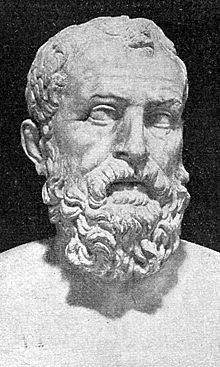Solon
Vide etiam paginam fere homonymam: Solon Stratonis filius
Solon[1] (Graece Σόλων) fuit archon Athenis anno 594/593 a.C.n., vir politicus rei publicae peritus, nomothetes, poeta Graecus. Natus est a nobilibus parum? divitibus. Illo tempore, civitas Athenarum contentione divitum atque pauperum fissa est. Solon omnibus persuasit ut concordiam colant. Is carmina de re publica, de vita hominis, de iustitia composuit. Etiam servos ex aere alieno liberavit.

De fabula philosophica recensere
Rex Lydiae Croesus, homo ditissimus, doctos homines ex omni Graecia libens invitabat atque magnifice habebat. Cum autem Solon ad se Sardis venisset rex. postquam divitias ei ostendit, sapientem interrogavit quemnam omnium mortalium beatissimum iudicaret, sperans se ipsum responsurum. At Solon Tellum Atheniensem nominavit atque secundo loco Cleobin et Bitonem. Cum autem indignaretur Croesus quod se et divitias suas sprevisset, Solon talem rationem responsi sui reddidit ː neminem nisi mortuum beatum dici posse ; adeo inconstanter fortunam res humanas gubernare[2] ǃ Ipsae res mox Croesum stultitiae coarguerunt qui filium infelici casu ab hospite Adrasto interfectum amisit et a Cyro Persarum rege bello victus regno caruit. Cum iussu victoris in pyra sederet igne iam inlato dicti Solonis reminiscens eius nomen ter exclamavit, mirante Cyro quisnam esset quem invocaret. Illa clarissima fabula ab Herodoto narrata saepe apud auctores antiquos memorata est et pictores inspiravit. Ostendit, quod Graecis antiquis cordi erat, quomodo dei ῦβριν[3] humanam castigent et quam infida res sit fortuna. Itaque Cyrus re comperta de supplicio Croesi sententiam mutavit et veniam ei dedit ab illa fabula edoctus hominem esse ut Croesum fortunae vicissitudinibus obnoxium[4].
Notae recensere
- ↑ Solōn vel Solō, gen. -ōnis, m. Oxford Latin Dictionary ed. P. G. W. Glare (Oxonii: Clarendon Press, 1968–1982).
- ↑ Herodotus, Historiae I.30-33
- ↑ Superbiam Latine dicere potes.
- ↑ Herodotus I.86. Israel Munoz Gallarte, "Hérodote et Plutarque: concernant la rencontre entre Solon et Crésus, roi de Lydie", PLOUTARCHOS, 2010/2011 ː 117-132. Irene Frings, Der Weise und der König. : Solon und Kroisos bei Herodot und Lukian, Torun, 1996.
Fontes recensere
- Andocides, De Mysteriis 82-4
- Aristoteles, De republica Atheniensium 5-14
- Politica II.7.6 et II.12.2-6 et III.9.8 et IV.11.15
- Ars Rhetorica 1375b
- Demosthenes, De falsa legatione 251-6, In Timocratem 212-214, Adversus Leptinem 90-94 et 102-4
- Plutarchus, Vita Solonis
Nexus interni
Bibliographia recensere
Conlectiones exstantium Solonis versuum recensere
- Hudaon-Williams, T. 1926. Early Greek Elegy: Ekegiac Fragments of Callinus, Archilochus, Mimmermus, Tyrtaeus, Solon, Xenophanes, and Others. Taylor and Francis. ISBN 0-8240-7773-3.
- Miltner, H. 1955. Fragmente / Solon. Vindobonae.
- Mülke, Cristoph. 2002. Solons politische Elegien und Iamben : (Fr. 1–13, 32–37 West). Munich. ISBN 3-598-77726-4.
- Preime, Eberhard. 1940. Dichtungen: Sämtliche Fragmente / Solon. Munich.
- Ruschenbusch, Eberhard. 1966. Nomoi : Die Fragmente d. Solon. Gesetzeswerkes. Wiesbaden: F. Steiner.
- West, Martin Litchfield. 1992. Iambi et elegi Graeci ante Alexandrum cantati: Callinus. Mimnermus. Semonides. Solon. Tyrtaeus. Minora adespota. Oxoniae: e typographeo Clarendoniano 1972, ed reimpressa 1992. (Graece)
Opera aliorum scriptorum recensere
- Andrews, A. 1967. Greek Society. Penguin.
- Blok, J., et A. Lardinois, eds. 2006. Solon of Athens: New Historical and Philological Approaches. Leiden, Brill.
- Campbell, D. 1998. Greek Lyric Poetry. Bristoliae; reimpr. (Graece)
- Cary. 1925. Cambridge Ancient History, vol. 3. Cantabrigiae: Cambridge University Press.
- Connor. 1971. The New Politicians of Fifth-Century Athens. Princeton.
- Connor, W., et al. 1990. Aspects of Athenian Democracy. Hafniae: Museum Tusculanam Press.
- Develin, R. 1977. Historia 26.
- Ehrenberg, V. 1973. From Solon to Socrates: Greek History and Civilization. Routledge.
- Ellis, J., et G. Stanton. 1968. Phoenix 22: 95-99.
- Forrest, G. 1995. Greece: The History of the Archaic Period. In The Oxford History of the Classical World, ed. J. Boardman, J. Griffin, et O. Murray. Novi Eboraci: Oxford University Press.
- Frost. 1976. Tribal Politics and the Civic State. AJAH.
- Garnsey, P. 1988. Famine and Food Supply in Graeco-Roman World. Cantabrigiae: Cambridge University Press.
- Goldstein, J. 1972. Historia 21.
- Grant, M. 1988. The Rise of the Greeks. Novi Eboraci: Charles Scribner's Sons.
- Harris, E. 1997. A New Solution to the Riddle of the Seisachtheia. In The Development of the Polis in Archaic Greece, ed. L. Mitchell et P. Rhodes. Routledge.
- Hendrickson, T. 2013, "Poetry and biography in the Athênaiôn politeiaː the case of Solon", The Classical Journalː 1-19
- Hignett, C. 1952. A History of the Athenian Constitution to the End of the Fifth Century B.C. Oxoniae.
- Hubbard, K. 2003. Homosexuality in Greece and Rome: a sourcebook of basic documents. University of California Press.
- Innis, H. 2007. Empire and Communications. Rowman and Littlefield.
- Kirk, G. 1977. Historia. 26.
- Lewis, D. 1963. Cleisthenes and Attica. Historia 12.
- Miller, M. 1971. Arethusa. 4.
- Morris, I. 2005. The Growth of City States in the First Millennium BC. Stanford.
- Mosse, C. 1979. Comment s'elabore un mythe politique: Solon. Annales 24.
- Ostwald, M. 1986. From Popular Sovereignty to the Sovereignty of the Law: Law, Society and Politics in Fifth-Century Athens. Berkeley.
- Rhodes, P. 1976. A History of the Greek City States. Berkeley.
- Rhodes, P. 1981. A Commentary on the Aristotelian Athenian Politeia. Oconiae: Oxford University Press.
- Robb, K. 1994. Literacy and Paideia in Ancient Greece. Oxoniae: Oxford University Press.
- Sealey, B. 1960. Regionalism in Archaic Athens. Historia 9.
- Stanton, G. R. 1990. Athenian Politics c. 800–500 BC: A Sourcebook. Londinii: Routledge.
- Woodhouse, W. 1938. Solon the Liberator: A Study of the Agrarian Problem. In Attika in the Seventh Century. Oxford University Ptess.
Nexus externi recensere
| Vicimedia Communia plura habent quae ad Solonem spectant. |
| Lexica biographica: Treccani • Большая российская энциклопедия • Gran Enciclopèdia Catalana • Deutsche Biographie • Store norske leksikon |